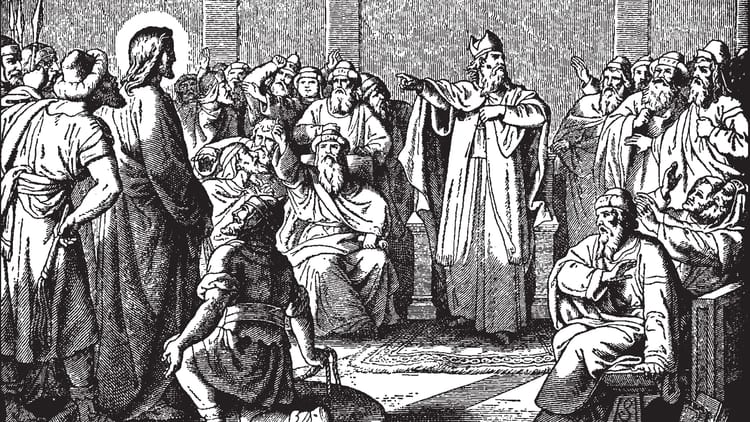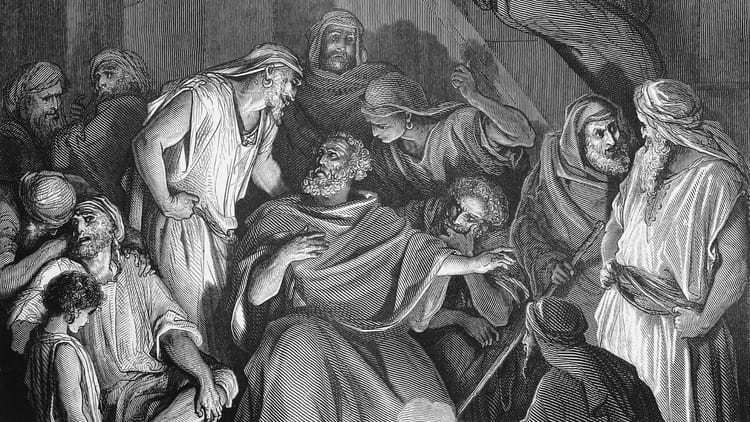The Faithless and the Faithful (Mark 14:43-52)

Big Idea: Jesus remains faithful even when we are faithless. We can put our trust in him.
It’s been a horrible couple of years. I don’t recommend looking at a picture of yourself from just over two years ago. I have a feeling that most of us have aged at least five years in the past two. It hasn’t been easy.
What I find interesting, though, is how different people respond. Some of my friends have responded in surprising ways, both positively and negatively. Some friends have risen to the occasion. I’ve been amazed to see how they’ve responded to adversity with courage and fortitude. Others, sadly, have done the opposite. I’ve scratched my head at the response of some of my friends who don’t seem to have fared very well in the past couple of years.
In a very real sense, our character is revealed in times of adversity. And that’s what the passage before us is about.
We’re in this short series leading up to Easter on how Jesus became king. And these past few weeks we’ve been following along as Jesus moves purposely to the cross to offer his life for ours. We’ve seen a variety of responses to Jesus: hostility, worship, betrayal, and laziness. At this moment of adversity, people responded in very different ways.
This continues tonight. I think Mark is asking us a question: how will you respond to Jesus when things get hard? In this passage we see three responses. We may find ourselves in one or more of them.
Some oppose.
And immediately, while he was still speaking, Judas came, one of the twelve, and with him a crowd with swords and clubs, from the chief priests and the scribes and the elders. Now the betrayer had given them a sign, saying, “The one I will kiss is the man. Seize him and lead him away under guard.” And when he came, he went up to him at once and said, “Rabbi!” And he kissed him. And they laid hands on him and seized him. (Mark 14:43-46)
You can’t read these words without feeling the sadness. If you were here last week, you know that Jesus was prepared for this. He’d just finished praying in the garden. Jesus is not a passive victim here. He is fully aware of what’s happening, fully prepared, even as he feels the weight of the burden he’s about to bear.
It’s horrific. Jesus isn’t just betrayed, but he’s betrayed by one of his followers, someone he’d chosen, someone who knew Jesus well. It’s treachery of the highest order.
Judas comes to the garden. Because he’s part of the inner circle, he gets close to Jesus without alerting the disciples to the danger. He gets close enough to kiss Jesus. The kiss is a sign of hospitality and friendship, but in this case it’s a kiss of betrayal. It’s meant to identify Jesus in the darkness so that the crowd can arrest him.
It’s probably not too shocking to you to read that Judas betrayed Jesus. Some of us are pretty familiar with the story. But I want you to notice that this is one of the first signs in Mark that this is going to happen. Mark has not alerted us that Jesus slipped out during the Last Supper. And in fact, Judas only gets passing notice here. The focus of the story is not on Judas but on Jesus who is fully in control of what is happening. In verses 48-49, Jesus challenges those who are opposed to him even as he recognizes that their actions serve to fulfil the Scriptures.
As Kent Hughes has said, “Judas’ infamous kiss showed how low a human heart can go.”
But we’re meant to ask: could this be us? Could I know Jesus, even be considered a friend of Jesus, and ultimately betray him?
Some people completely oppose Jesus and his reign. Some do so in sneaky ways. They appear to be followers of Jesus but have never truly submitted to him. Others make no bones about their opposition to Jesus.
Mark wants to ask us: when adversity comes, will we oppose Jesus like Judas and those who arrested him? Don’t make this mistake. Don’t miss who is before you. Don’t miss out on Jesus. If you do, you will lose your soul.
Some oppose Jesus. But that’s not the only response.
Some fight.
Verse 47 reads, “But one of those who stood by drew his sword and struck the servant of the high priest and cut off his ear” (Mark 14:47).
Wow. This event is so important that all four gospels mention it. As usual, Mark doesn’t give us many details. We learn all kinds of other details from the other gospels:
- which disciple attacked (no surprise: Peter)
- the name of the servant
- what was said beforehand
- what Jesus said after
- how Jesus healed the servant’s ear
But Mark doesn’t focus on any of this. He just wants us to see another possible response to Jesus. It is possible to respond to hostility to Jesus with our own hostility. We can become the same version of what we oppose. We can end up fighting for Jesus using methods that are opposed to the way of Jesus. He had good intentions, but he used inappropriate means to accomplish those purposes.
Jesus didn’t tell us to fight his enemies like this. How did Jesus respond to those who killed him? Right from the cross he said, “Father, forgive them, for they know not what they do” (Luke 23:34). What’s interesting is that Jesus prayed this prayer aloud. He could have prayed silently but he didn’t. Why? I think it might be because he wanted those who were killing him to know that he wanted them to know they could be forgiven if they turned to him. Jesus taught us, “Love your enemies and pray for those who persecute you” (Matthew 5:44), and he lived it too.
Do you like to fight? Learn from Jesus. In the 19th century, two prominent preachers started fighting each other. One wrote a bitter pamphlet against the other but couldn’t think of a good name for the pamphlet. The funny thing is that he’d written another popular pamphlet earlier called Come to Jesus. So one of his friends came up with a good idea. He said. “The title which I suggest for your pamphlet is this, ‘Go to Hell’ by the author of ‘Come to Jesus.’”
Sometimes we’re like that. Some oppose Jesus, but some fight for Jesus. It’s maybe a little better, but it still misses the point.
But there’s a third way that we can respond.
Some flee.
This response is so short that you can almost miss it. It’s just five words in the original Greek, but they’re perhaps the saddest five words we’ve ever read. Our English version simply says, “And they all left him and fled” (Mark 14:50).
Can you imagine sadder words? I get it. I can imagine the commotion. Swords had been pulled. An ear had been cut off. I can imagine the tension as it looked like things were going to get messy. Who knows how you and I would respond in a situation like that?
There is a little glimmer of hope. Read verses 51 and 52: “And a young man followed him, with nothing but a linen cloth about his body. And they seized him, but he left the linen cloth and ran away naked.”
What a description. We don’t know his name. We have all kinds of theories about who this might have been. I read 13 theories. It may have been Mark, the author of this gospel, but we simply don’t know. He does a little bit better. He follows Jesus a little bit more than the others, but in the end even he flees naked and ashamed and Jesus is left completely alone. It reminds us of Amos 2:16: “he who is stout of heart among the mighty shall flee away naked in that day.”
See the sadness of Jesus completely abandoned by everyone. Mark is reminding us of our complete and utter failure. Our hope is not in ourselves.
I listened to a podcast this week about what we’ve learned over the past two years. In the middle of the podcast, one of the hosts spoke about the courage shown by Ukrainians this past month. He heard a politician who was asked, “Do you think you could react with that kind of courage?” The politician wisely responded: “Nobody knows how they would react until they’re in that situation.”
That’s so insightful. How would you react if you were in the garden when Jesus was being arrested? The truth is that none of us know. We hope that we would stand with Jesus when our lives are at stake, but the question remains: would we? Or would we be like those who left him and fled?
In verse 31, the disciples told Jesus they’d stay with him even if it cost their lives. Now, just a few moments later at the first sign of trouble, they run for their lives. It’s such a good picture of our hearts, isn’t it? How often have we pledged our allegiance to Jesus on Sunday only to completely betray him just hours later?
I just read this earlier today: “If we see the mistakes of OTHER Christians, we have therefore to think how much greater could have been OUR failure if we had been exposed to the same temptations” (Iain Murray). We’re not any better than they were.
That’s why we need to place our confidence in Jesus. If we rely on our own strength, we’re in a heap of trouble. If we rely on Jesus’ grasp of us, we’re in a pretty good place. Our hope is not found in our own strength. Our hope is found in Jesus. Friends, don’t rely on yourself. You will let yourself down over and over again. You are weak. Look to Jesus. Trust in him. He is our hope.
It’s also why we need what we’re doing today. We need this regular recalibration. Left to ourselves, we’ll drift and compromise. We need to come together to sing, to hear God’s Word, to confess our sins, to come to the table, and to fellowship with each other so we don’t flee from Jesus. Everything in this world is tearing us away from him. We dare not trust our own strength. We need Jesus, and we need the regular means of grace to tether us to him because he is our only hope.
Who is left when everyone abandons, fights and flees? Only one: Jesus. Only Jesus doesn’t waver. Jesus remains faithful even when we fail him. “If we are faithless, he remains faithful — for he cannot deny himself” (2 Timothy 2:13).
Look to Jesus today. You will let him down. Your hope is not in yourself. Your only hope is in Jesus who remains faithful and who saves faithless people like us. Put your trust in him today.






